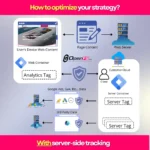Crafting a Winning SEO Strategy for 2025: Beyond Keywords
Your SEO strategy might be the difference between attracting ideal customers or watching them flock to your competitors. As a New Jersey business owner with a beautiful website that’s not generating traffic, you’re definitely not alone. I’ve spoken with countless entrepreneurs who invested significantly in professional websites only to hear crickets instead of conversion bells.
The truth is, search engine optimization has evolved far beyond keyword stuffing. Today’s successful SEO strategy resembles building a home – you need a solid foundation (technical SEO), attractive exterior (on-page elements), neighborhood reputation (off-page signals), and inviting interior spaces (quality content) that visitors want to explore.
The Essential Components of an Effective SEO Strategy in 2025
After helping numerous New Jersey businesses transform their digital presence, I’ve discovered that sustainable growth comes from comprehensive strategies rather than quick fixes. Let me break down what actually moves the needle for your rankings and lead generation:
Technical SEO: Building Your Digital Foundation
Technical SEO works like your building’s infrastructure – invisible to visitors but critical for functionality. Without it, even exceptional content can’t perform. A robust technical foundation includes:
- Site speed optimization – because every loading second increases bounce rates
- Mobile responsiveness – with over 60% of searches now happening on smartphones
- Proper indexing – through XML sitemaps and strategic robots.txt files
- Schema markup implementation – providing context to search engines
- Security protocols – including SSL certification and data protection
At Digital Marketing New Jersey, we always begin with comprehensive technical audits to identify hidden barriers preventing your site from achieving top rankings. Technical issues frequently sabotage otherwise excellent content strategies, making this foundation crucial.
Local SEO Strategy: Capturing New Jersey Customers
For businesses serving New Jersey customers, local SEO becomes your competitive edge. Most business owners significantly underestimate local search power. Consider that when someone searches “electrician near me” or “best Italian restaurant in Hoboken,” they’re typically ready to make immediate purchase decisions.
Your local SEO strategy must include:
- Google Business Profile optimization – creating a compelling digital storefront
- Consistent NAP information – maintaining identical Name, Address, and Phone details across all platforms
- Strategic local citations – appearing in relevant business directories
- Community-focused content – demonstrating local expertise and relevance
- Review management system – actively collecting and responding to customer feedback
Furthermore, Google My Business optimization often delivers faster results than traditional SEO, making it an essential component for local businesses looking to increase visibility quickly.
On-Page SEO Strategy: Creating Content That Connects
On-page optimization gives you direct control over how search engines interpret your content. Moreover, these elements typically offer the quickest path to ranking improvements. Every page should serve a clear purpose while satisfying both search algorithms and human visitors.
Content Development: Beyond Just “Good Writing”
After years helping businesses grow online, I’ve learned a crucial truth: content isn’t automatically king – relevant content that solves problems is. Your audience cares less about your industry jargon or accolades and more about finding solutions to their challenges.
A winning content strategy prioritizes:
- Search intent alignment – answering the questions behind searches
- Comprehensive resource creation – becoming the definitive source in your field
- Conversational language – matching how your customers actually speak
- Strategic keyword integration – without appearing forced or artificial
- Content freshness – regularly updating information to maintain relevance
Additionally, exceptional content naturally attracts backlinks, supporting your off-page SEO efforts through organic link acquisition rather than artificial link building.
Authority Building: Off-Page SEO Strategies
Off-page SEO essentially represents your digital reputation. Search engines analyze who’s referencing you and what they’re saying. Quality backlinks from authoritative sites signal to Google that your content deserves higher rankings.
Modern link building has matured significantly. Instead of purchasing questionable links, today’s effective off-page strategy requires:
- Earning editorial mentions through genuinely valuable resources
- Developing industry relationships with complementary businesses
- Contributing expert content to respected publications
- Developing shareable assets like interactive tools or original research
- Regular backlink profile monitoring to identify and disavow harmful links
Integrating Paid and Organic Search Strategies
I frequently hear business owners express frustration with SEO’s timeline: “I need leads now, not six months from now.” That’s precisely where combining organic SEO with paid search marketing creates powerful synergy.
Think of it this way: PPC advertising gets you immediate visibility while your SEO strategy builds long-term organic presence. SEM campaigns can target high-intent keywords while your organic rankings develop, creating comprehensive search visibility that addresses both immediate needs and sustainable growth.
Data-Driven Decision Making in Your SEO Strategy
A common frustration I hear from business owners is uncertainty about marketing effectiveness. That’s why measurement forms the backbone of any successful SEO strategy. You need clearly defined metrics connected directly to business objectives.
Effective performance tracking includes:
- Organic traffic trends – monitoring visitor growth patterns
- Ranking positions – for commercially valuable keywords
- Conversion analytics – tracking leads and sales from organic search
- User engagement signals – including time on site and pages per session
- Return on investment calculations – connecting SEO efforts with revenue
Common SEO Strategy Pitfalls to Avoid
After working with hundreds of New Jersey businesses, I’ve witnessed the same strategic mistakes repeatedly undermining otherwise solid digital marketing efforts:
The “One-Time Project” Misconception
SEO isn’t a set-it-and-forget-it endeavor—it’s an ongoing process requiring consistent attention. Search algorithms constantly evolve, competitors regularly adapt their approaches, and user behaviors shift over time. Consequently, your strategy needs regular refinement to maintain effectiveness.
Neglecting User Experience Factors
Google increasingly rewards websites providing exceptional user experiences. This means intuitive navigation, fast-loading pages, and content that genuinely answers visitor questions. Your website design choices directly impact SEO performance, making UX an essential consideration rather than a separate concern.
Chasing Algorithm Updates Instead of Principles
While staying current with industry developments matters, jumping on every SEO trend often dilutes your strategic focus. The most successful businesses prioritize fundamental optimization principles that consistently deliver results rather than frantically adapting to every algorithm rumor.
Building Long-Term SEO Success Through Strategy
The most successful businesses understand that SEO resembles a marathon rather than a sprint. They invest in strategic approaches that compound over time, creating competitive advantages that strengthen with each passing month.
A comprehensive SEO roadmap typically includes:
- Initial performance benchmarking – establishing clear starting points
- Thorough competitive analysis – understanding market positioning
- Strategic keyword research – identifying high-value targeting opportunities
- Structured content planning – creating publishing schedules
- Technical optimization framework – establishing regular maintenance protocols
- Relationship-based link building – developing authentic industry connections
Furthermore, your strategy should remain flexible enough to adapt based on performance data and market changes. The most effective approaches combine structured frameworks with agile adjustment capabilities.
Measuring and Optimizing Your SEO Strategy
Genuine SEO success comes through continuous improvement cycles. Monthly analysis should examine what’s working, what needs adjustment, and where new opportunities exist. This is where conversion rate optimization becomes essential—transforming traffic increases into actual business results.
Transparency should characterize your SEO reporting. You deserve to understand exactly what actions are being taken, why they matter, and how they connect to your business objectives. Comprehensive monthly reporting should include clear performance metrics, plain-language explanations of completed work, data-driven recommendations, competitive insights, and ROI calculations demonstrating actual value.
Taking Action: Implementing Your SEO Strategy
Reading about SEO strategy differs fundamentally from successful implementation. Many businesses become paralyzed by analysis, researching endlessly without taking concrete action. Meanwhile, their competitors steadily climb rankings and capture market share.
If you’re committed to improving your online visibility, begin with these practical steps:
- Commission a professional SEO audit to establish your current position
- Analyze your top competitors to understand their strategic approaches
- Develop realistic timelines with both short and long-term objectives
- Commit to consistent implementation rather than sporadic efforts
- Consider professional partnerships with experts who understand your market
The businesses that thrive online aren’t necessarily the largest or best-funded. They’re the ones implementing clear strategies consistently and partnering with knowledgeable guides. Whether you need comprehensive SEO services or targeted assistance with specific optimization aspects, success begins with strategic alignment between your business objectives and available resources.
Your competitors aren’t standing still—and you shouldn’t either. A well-executed SEO strategy can transform your business from overlooked to irresistible, attracting qualified prospects actively searching for your solutions. The question isn’t whether you need strategic SEO, but how quickly you can implement an approach that delivers measurable results.
Frequently Asked Questions About SEO Strategy
How long does it typically take to see results from a new SEO strategy?
While some improvements may appear within weeks (especially from technical fixes), meaningful ranking changes typically emerge within 3-6 months. Local SEO often shows faster results than broader campaigns. The timeline varies based on your industry competitiveness, website history, and strategy implementation quality.
What’s the most important ranking factor to focus on in my SEO strategy?
Rather than chasing a single “most important” factor, focus on comprehensive optimization. That said, relevant, high-quality content that genuinely addresses user intent consistently delivers the strongest results, especially when supported by solid technical foundations and quality backlinks.
Should small businesses handle their SEO strategy in-house or hire professionals?
This depends on your resources and expertise. While basic SEO principles can be implemented internally, professional strategists bring specialized knowledge, competitive insights, and time-saving efficiency. Many successful businesses use a hybrid approach—handling content creation internally while partnering with experts for technical implementation and strategy development.
How much should a comprehensive SEO strategy cost for a small business?
SEO investments vary widely based on business size, market competitiveness, and current website conditions. Quality SEO services typically range from $1,000-$5,000 monthly for small to medium businesses. Beware of extremely low-cost providers promising unrealistic results—effective SEO requires significant expertise and consistent effort.
 Written by: Romulo Vargas Betancourt
Written by: Romulo Vargas Betancourt
CEO – OpenFS LLC







